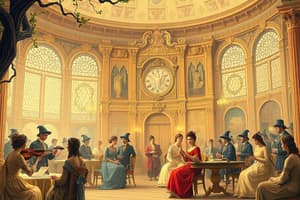Podcast
Questions and Answers
What are the dates of the Classical Period?
What are the dates of the Classical Period?
1750-1820
Philosophers and writers, especially Voltaire and Denis Diderot saw their time as a turning point in history and referred to it as the _________________.
Philosophers and writers, especially Voltaire and Denis Diderot saw their time as a turning point in history and referred to it as the _________________.
Age of Enlightenment
Social upheaval marked this seventy-year period, as this time encompassed four major wars including _______________________________.
Social upheaval marked this seventy-year period, as this time encompassed four major wars including _______________________________.
the Seven Years' War, Napoleonic Wars, American and French Revolutions
Power shifted from the church and aristocracy to __________________.
Power shifted from the church and aristocracy to __________________.
In the visual arts during the early 18th century, the heavy monumental style of the baroque style gave way to ____________, with its ______________________.
In the visual arts during the early 18th century, the heavy monumental style of the baroque style gave way to ____________, with its ______________________.
Later this style was superseded by the ___________ style, which attempted to recapture the 'noble simplicity and calm grandeur' of ancient Greek and Roman art.
Later this style was superseded by the ___________ style, which attempted to recapture the 'noble simplicity and calm grandeur' of ancient Greek and Roman art.
Neoclassical artists emphasized ______________, and ________________.
Neoclassical artists emphasized ______________, and ________________.
Polyphonic texture was neglected in favor of a tuneful ________________ and ______________ harmony.
Polyphonic texture was neglected in favor of a tuneful ________________ and ______________ harmony.
Comparable to the rococo style in art, ________________ was applied to the light graceful music of the early Classical period.
Comparable to the rococo style in art, ________________ was applied to the light graceful music of the early Classical period.
The three master composers of the Classical period were _________________, _________________, and _____________.
The three master composers of the Classical period were _________________, _________________, and _____________.
Whereas a late baroque piece may convey a single emotion, a classical composition will _______________ in mood.
Whereas a late baroque piece may convey a single emotion, a classical composition will _______________ in mood.
Rhythm in the classical era made use of a wealth of rhythmic patterns, including ____________, ______________, and frequent changes from ____________________.
Rhythm in the classical era made use of a wealth of rhythmic patterns, including ____________, ______________, and frequent changes from ____________________.
The texture of classical era music is basically __________.
The texture of classical era music is basically __________.
Melodies in the classical style tend to be easy to remember because they are often based on ____________ melodies and sound balanced and symmetrical because they are frequently made up of ____________.
Melodies in the classical style tend to be easy to remember because they are often based on ____________ melodies and sound balanced and symmetrical because they are frequently made up of ____________.
Classical composers' interest in expressing shades of emotion led to a widespread use of gradual dynamic change like: ____________ and ____________.
Classical composers' interest in expressing shades of emotion led to a widespread use of gradual dynamic change like: ____________ and ____________.
What was the smaller and quieter version of the modern piano called that Beethoven, Mozart, and Haydn wrote for?
What was the smaller and quieter version of the modern piano called that Beethoven, Mozart, and Haydn wrote for?
Along with classical composers wanting more control over their music, another reason for the disappearance of the basso continuo was because more music was being written for _____________ who had not ______________________.
Along with classical composers wanting more control over their music, another reason for the disappearance of the basso continuo was because more music was being written for _____________ who had not ______________________.
Flashcards are hidden until you start studying
Study Notes
Classical Period Overview
- The Classical Period spans from 1750 to 1820.
- This era marked a significant cultural and intellectual transformation known as the Age of Enlightenment.
Historical Context
- The period experienced social upheaval, including major conflicts like the Seven Years' War, Napoleonic Wars, American and French Revolutions.
- Power transitioned from religious and aristocratic authorities to the Middle Class.
Artistic Movements
- The heavy, monumental Baroque style transitioned to the lighter, more ornate Rococo style characterized by light colors and curved lines.
- Rococo later gave way to Neoclassical art, which aimed to emulate the "noble simplicity and calm grandeur" of ancient Greek and Roman works.
Neoclassical Characteristics
- Neoclassical artists emphasized firm lines, clear structure, and moralistic themes.
Musical Features
- The Classical era music favored tuneful melodies and simple harmonies over polyphonic textures.
- The galant style mirrored the Rococo aesthetic, influencing the light and graceful music of the early Classical period.
Key Composers
- Notable composers of the Classical period include Joseph Haydn, Wolfgang Amadeus Mozart, and Ludwig van Beethoven.
Emotional Expression in Music
- Unlike late Baroque compositions that often conveyed a single emotion, Classical pieces frequently fluctuated in mood.
- Rhythm during this era introduced varied patterns, unexpected pauses, syncopations, and transitions from long to short notes.
Texture and Melody
- The predominant texture in Classical music is homophonic, allowing a clear melody to stand out.
- Melodies are typically easy to remember and often structured in balanced phrases of equal length.
Dynamics and Instrumentation
- Composers used gradual dynamic changes, such as crescendo and decrescendo, to express complex emotions.
- The fortepiano, a smaller and quieter instrument than the modern piano, was used by composers like Beethoven, Mozart, and Haydn.
Cultural Shifts
- The decline of the basso continuo was influenced by composers' desires for more musical control and the increasing amount of music being composed for musicians who had not received formal training.
Studying That Suits You
Use AI to generate personalized quizzes and flashcards to suit your learning preferences.




